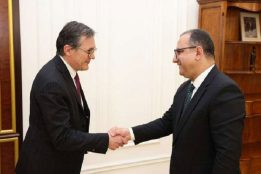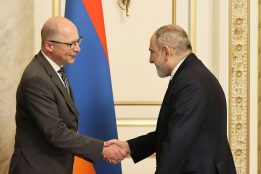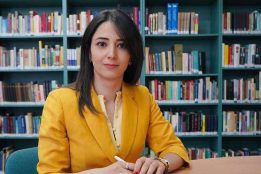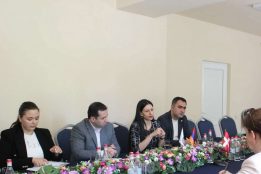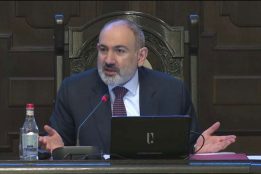Steven Heydemann, Senior Adviser for Middle East Initiatives, United States Institute of Peace interviewed Bernard Gwertzman, Consulting Editor at Council for Foreign Affairs. Find the interview below:
Turkey’s public is becoming increasingly concerned about the possibility of war with Syria, says Steven Heydemann, an expert for the United States Institute for Peace who has just returned from Turkey. Heydemann said Turks are also worried “about the economic and social consequences of a conflict that has already forced more than 100,000 Syrian refugees into southern Turkey.” He says that the recent tensions with Russia and Iran have effectively ended Turkey’s efforts to have harmony in its relations with its neighbors.
Why do you think the Turkish government is now so seemingly focused on ending the reign of Syrian President Bashar al-Assad? What is the reaction within Turkey to the mounting tensions?
The Turkish public is nervous about its government’s aggressive policy toward Syria. It is concerned that Turkey could be drawn into war, and worried about the economic and social consequences of a conflict that has already forced more than 100,000 Syrian refugees into southern Turkey. This is not to say that the Syrian president has much support among Turks. With the exception of Turkey’s Alevi community, which feels some connections to the Alawite community to which Assad himself belongs (and which, numbering some 23 million, is the equivalent of Syria’s entire population), Turks are broadly supportive of the Syrian revolution, and critical of the Assad regime.
Prime Minister Recep Tayyip Erdogan has clearly antagonized the Russians and the Iranians, both of whom support Assad, but won friends elsewhere with his Syrian policy, but how much tension is this causing for Turkey?
Prime Minister Erdogan’s willingness to antagonize Iran and Russia–as in the recent forced landing of a Syrian civilian jetliner flying from Moscow to Damascus–may be the final nail in the coffin of Turkey’s “no problems with neighbors” policy. Where it previously prided itself on a pragmatic approach to even its most difficult neighbor, Iran, and had cultivated close ties to the Assad regime, the Turkish government now seems to view all of its regional relations through a Syria lens.
It has made clear that Iranian, Russian, and even Iraqi support for the Assad regime will carry a price in terms of relations with Turkey. This has amplified short-term tensions with Russia, which supplies Turkey with a significant share of its energy, but probably does not signal a fundamental erosion of ties between the two governments. In the Iranian case, Turkey’s support for the overthrow of Bashar al-Assad, Tehran’s leading regional ally, will be harder to overcome and could well mark an extended period of tension between Turkey and Iran, two pivotal states in the broader Middle East.
What is the likelihood of actual armed conflict between Syria and Turkey beyond the low-level shelling of the past week?
Turkey has reinforced its military presence along the Syrian border. It has responded to every instance of shelling from Syria, and has threatened to escalate the fighting further if the security situation continues to deteriorate. The tension along the border creates the possibility that small-scale events could trigger a broader conflict, but it is clear that Turkey’s leaders are deeply reluctant about the prospect of war, and will avoid initiating a conflict unless they feel they have no other choice. Recognizing this, the Assad regime has been willing to call Turkey’s bluff. It has continued to engage Turkish forces in tit-for-tat artillery fire, and has been uncompromising in its response to threats from the Turkish government. Essentially, the Assad regime is testing the seriousness of Turkey’s aggressive rhetoric. The Erdogan government has prepared for wider conflict, but thus far is not yet prepared to escalate further.
How does the new anti-Syrian policy relate to the Kurds, the minority group in Turkey, who are at war with the government and have a presence near the Turkish border in Syria just as they do in Iraq?
Violence in Turkish Kurdistan has spiked sharply this year, a trend that is often linked in Turkey to the impact of the Syrian revolution on Kurdish politics across the region. Within Syria, the Assad regime has largely withdrawn from Kurdish areas of the country, leaving them in the hands of Kurdish forces aligned with the PKK, a Kurdish party that both the Turkish and U.S. governments have labeled as a terrorist organization.
Heightening Turkish concerns, Syria’s Kurds have waffled about their commitment to the territorial integrity of a future, post-Assad Syrian state. Leaders of the Kurdish National Council in Syria often define their demands in terms of federalism that would leave them with considerable autonomy over local affairs. Yet they have sent mixed signals about their intent to seek an independent Kurdish entity of some kind, a prospect that Turkish authorities would view as potentially destabilizing for the Kurdish majority regions of Turkey.
There are now reports saying that most of the arms from the Arab world to help the anti-Assad forces are going to jihadists and other extremists. If Assad is overthrown by these extremists does this really upset the calculations of everyone in the Middle East?
We should not exaggerate the significance of jihadist elements among the armed opposition in Syria. They are present. They benefit from the unwillingness of the United States and others to arm the moderate opposition. Yet they remain a relatively small component of the armed opposition, and have not found much local support. In fact, there are growing indications of conflicts between jihadists and the Free Syrian Army (FSA). It was reported recently that the FSA turned over to Turkish authorities a group of foreign fighters trying to enter Syria. In addition, the volume of weapons supplied from outside of the country represents a small share of the arms currently deployed by the FSA.
The vast majority of its weapons are captured, stolen, or purchased from the Syrian Army. That said, the willingness of wealthy Salafist patrons (especially in the Gulf) to provide weapons to like-minded fighters on the ground is having an effect. Some armed groups that are not Salafist have adopted a jihadist profile to attract funding and weapons. And while providing arms does not always buy influence, there’s no question that the United States and other governments that have refused to do so are viewed with growing hostility by the armed opposition (and by Syrians more broadly), and can expect to have little leverage over the armed opposition as the conflict unfolds.
Should President Obama do anything dramatic at this juncture?
It is not necessary for the U.S. to do anything dramatic to affect the course of events on the ground in Syria. No direct U.S. intervention is needed; it is not desired by Syrians. A modest shift in policy, permitting the United States to engage more fully with the armed opposition and to provide it with training and equipment (including anti-tank weapons) could well be sufficient to change the dynamics of the conflict. With only light weapons, the Syrian opposition has taken control of almost half of the country. It has engaged the regime in guerrilla warfare in every major urban center. It has significantly degraded the capacity and morale of the Syrian army, while gaining in experience and ability.
To survive, the Assad regime has been forced to turn to fighters from Hezbollah and, it seems, from Iran. A modest additional increment in its arsenal could well turn out to be decisive for the opposition. And the more quickly the Assad regime is overthrown, the less likely it becomes that the armed opposition will become dominated by jihadists.
There now seem to be some 200,000 Syrian refugees in Jordan and some 100,000 in
Turkey, and thousands in Iraq. What should be done about this?
Conditions for a massive humanitarian disaster are in place in Syria, especially as winter arrives. Refugee flows are increasing. Turkey and Jordan are both stretched in providing for refugee populations that now top 300,000. Conditions may be even more dire for the two million Syrians who are internally displaced. To date, the largest share of U.S. and Western aid for Syria has gone for humanitarian relief efforts by the UN and other international agencies and NGOs, but there’s little question that much, much more will be needed.

















